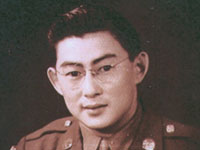| Grant Jiro Hirabayashi |

Grant Hirabayashi, Chungking, China [March 1945] | World War II, 1939-1946
Army
5307 Composite Unit Provisional (Merrill's Marauders)
Fort Lewis, Washington; Fort Leavenworth, Kansas; Camp Savage, Minnesota; Bombay, India; China-Burma-India (CBI) Theater
Technical Sergeant
Kent, WA
 |
|
 |
The famed commandos of Merrill's Marauders, a unit of soldiers who slogged their way through the Burmese jungles to overcome the Japanese occupiers, consisted of a number of Japanese American, or Nisei. They served in both intelligence and combat capacities, translating captured documents and fighting where needed. Grant Hirabayashi was among these men, and he had to fend off not only the usual assortment of jungle-bred ailments such as dysentery and malaria, but also an allergy to the preservatives used in K-rations. Hirabayashi would later serve in India and China; in the late days of the war, he interrogated Japanese POWs, one of whom accused him of betraying his people.
|
|

